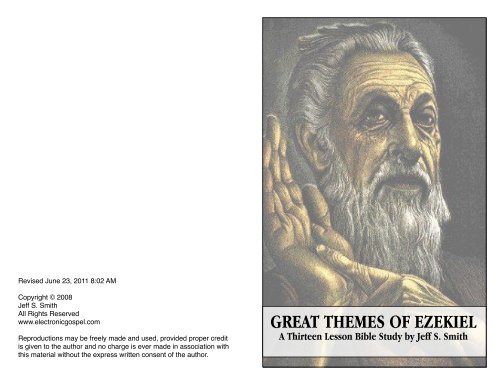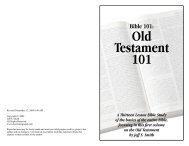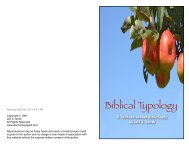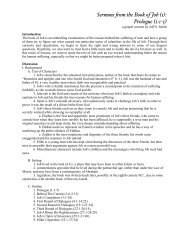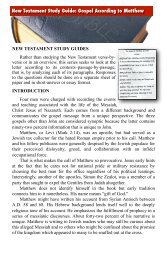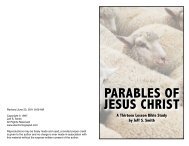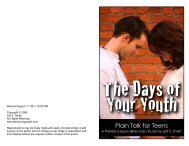GREAT THEMES OF EZEKIEL - ElectronicGospel
GREAT THEMES OF EZEKIEL - ElectronicGospel
GREAT THEMES OF EZEKIEL - ElectronicGospel
Create successful ePaper yourself
Turn your PDF publications into a flip-book with our unique Google optimized e-Paper software.
Revised June 23, 2011 8:02 AMCopyright © 2008Jeff S. SmithAll Rights Reservedwww.electronicgospel.comReproductions may be freely made and used, provided proper creditis given to the author and no charge is ever made in association withthis material without the express written consent of the author.<strong>GREAT</strong> <strong>THEMES</strong> <strong>OF</strong> <strong>EZEKIEL</strong>A Thirteen Lesson Bible Study by Jeff S. Smith
7. Before, especially in the wilderness, God would not cut off his peoplebecause it would cause his name to be mocked among the heathen. Why ishe no longer as concerned about that (22:1-12)? What enables Christians toforget God, if only temporarily (Titus 1:15-16)? How do we keep frombecoming human dross (Second Timothy 2:20-21)?Judgment can wait no longer because Judah has fallen so far in forgettingGod altogether. Dross is rubbish and it is burned up or disposed of until itceases to be. Unless we would be cast away, we must overcome ourdishonors.8. God discusses his judgment upon Israel’s enemies. How should we actwhen one of our enemies is humbled (Romans 12:17-21)?We should not mock them, even if we are pleased that they have beenhumbled. We should offer them assistance in the hope they will change.9. To what does the prophet liken Pharaoh (29:1-7)? The key seems to behuman willingness to acknowledge God. What is included in acknowledgingGod (First John 2:20-27, Hebrews 11:6)?Ezekiel likens him to a crocodile or dragon swimming around in the Nile,which he considered to be his river and creation. One must believe, trust,obey and submit to him.10. Whose fault is it if one does not heed a legitimate warning and he fallsas a result (33:1-5)? How does this caution apply when all the prophets aredead, but the church still needs warnings (Second Timothy 4:5, Hebrews13:17)?Anyone who refuses to heed a legitimate warning is solely responsible forthe troubles that result, but if the watchman fails to sound a warning, thenhe is also to blame. Today, we can utilize the New Testament prophecies asimportant warnings and listen to our bishops and preachers who repeatthose warnings and apply them to present conditions.11. What is the “Most Holy Place” (41:1-4; Leviticus 16:1-4, 34)? How didChrist enter it as well (Hebrews 9:1-14)?The Most Holy Place was the inner and most sacred room of the temple, intowhich only the High Priest entered once a year on the Day of Atonement.Christ entered once for all by his own death.12. What was to become the name of the city (48:30-35)? Why was thissignificant to the exiles? How does the church compare to this description(First Timothy 3:15)? How does heaven compare (Revelation 21:1-5)?The name was to become “THE LORD IS THERE.” It had been a long timesince the exiles had enjoyed the presence of God in this way. The church isthe household of God while heaven is his throne where he will have directfellowship with the redeemed.IntroductionIt was in 597 B.C. that Babylon’s King Nebuchadnezzar deportedIsrael’s King Jehoiachin along with 10,000 of his leading citizens. Amongthem was the prophet and priest, Ezekiel, who had grown up under the godlyreforms of King Josiah and who continued to show an affinity for truth andthe kind of honest visions that came from Jeremiah. Ezekiel settled intoexile in Tel-Abib by the River Kebar, but five years later, he was summonedinto his own prophetic ministry through a vision from God. Althoughadamant and dedicated, Ezekiel’s warnings were rejected by most peoplewho simply did not take him seriously. The book that bears his name recordsevents in his captivity and his attempts to show the exiles why God hadallowed them to be taken, that they might reform.Syllabus1. Spokesman to the Exiles (Ezekiel 1-3) ..................................................... 12. Siege of Jerusalem (Ezekiel 4-7 )..............................................................33. Visions of the Temple (Ezekiel 8-11 ) ....................................................... 54. Jerusalem’s Judgment (Ezekiel 12-14 ).....................................................75. Metaphor, Allegory, Parable (Ezekiel 15-17 )...........................................96. Individual Responsibility (Ezekiel 18 )...................................................117. Degradation and Doom (Ezekiel 19-24 ) ................................................ 138. Oracles Against Nations (Ezekiel 25-28 ) ............................................... 159. Oracle Against Egypt (Ezekiel 29-32 ) ................................................... 1710. Grace and a New Heart (Ezekiel 33-39 ) ................................................ 1911. Restoration of the Temple (Ezekiel 40-44 ) ........................................... 2112. Restoration of the Land (Ezekiel 45-48 ) ................................................ 2313. Review .................................................................................................... 2526! JEFF S. SMITH
Printing Instructions1. Download the booklet and open it in Adobe Reader.2. Print ONLY the ODD pages.3. Now FLIP THE PILE OVER so the blank sides are ready.4. Print ONLY the EVEN pages.5. Fold the pages in the middle and staple twice along the spine.Copyright• This title is Copyright © 2008, Jeff S. Smith, All Rights Reserved• All scripture quotations, unless otherwise indicated, are taken from the New KingJames Version®. Copyright © 1982 by Thomas Nelson, Inc. Used by permission.All rights reserved.• On the Cover: Ezekiel, a portrait by Guy RoweLesson 13: Review1. Why couldn’t Ezekiel enter fully into his priestly duties once he reachedthe age of 30 (1:1-3)? How did God show him that he had another office inmind? Why didn’t God express much confidence in his prospects (2:1-5)?Ezekiel could not enter into the full priesthood because he was inBabylonian exile, but God called him instead to prophesy through thesevisions of God. God acknowledged that Israel was a rebellious house, evenin captivity. They were disrespectful toward God’s commands and tooobstinate to see that he was challenging them to make correction.2. What did God have Ezekiel make for a sign for the house of Israel(4:1-3)? How might this have looked to the exiles? How severe would thefamine get (5:5-10; Jeremiah 19:9, Lamentations 4:10)?Ezekiel made a model of Jerusalem under siege, using an engraved brick,dirt and an iron griddle. Ezekiel might have appeared to be playing withtoys, but he was making a serious point. The people would resort tocannibalism to stay alive.3. What did Ezekiel see in his vision (8:1-6)? Explain. How did God say hewas responding to this (verse 6; Matthew 6:19-24, James 4:7-10)?Ezekiel saw in the Jerusalem temple an idolatrous image that provoked thejealousy of God because it introduced wickedness to the people and robbedthem of truth and blessing. Because the north gate opened to the king’spalace, the monarch was responsible for this abominable act. All this hadforced God to abandon the temple.4. What reason did God give for allowing a remnant to escape hisdevastation (12:7-16)? How did Judah interpret God’s patience (12:21-28)?Why is God so patient (Romans 2:4-13, Second Peter 3:1-9)?God wanted them to declare all their abominations among the nations intowhich they would go as exiles, to know the Lord. They turned it into aproverb that suggested he would never actually fulfill these prophecies. Godyearns to save souls, but too many are unwilling.5. To what does God compare Judah (16:44-52)? Why did Jesus return tothis theme in his ministry (Matthew 10:14-15, 11:20-24)? What is thebenefit of shame (16:53-63, Second Corinthians 7:8-12)?Ezekiel compares Judah to Samaria and Sodom because, as they were moreaccountable, their failures were more severe. Jesus indicted his detractorson the same basis. Shame leads the softhearted to make corrections.6. How would you characterize their proverb (18:1-2)? What do we inheritfrom Adam (Romans 5:12-14, 8:1-4; First Corinthians 15:20-22)?They were simply trying to “pass the buck” backward to their parents, whenin fact, they were equally guilty of this unfaithfulness. We do not inherit asinful nature or Adam’s condemnation, but only the frailty of his human fleshand a sinfully corrupted environment.<strong>GREAT</strong> <strong>THEMES</strong> <strong>OF</strong> <strong>EZEKIEL</strong>! 25
7. Ezekiel speaks of the prince’s voluntary offering (Ezekiel 46:9-24). Inwhat way is the Christian’s financial contribution voluntary (SecondCorinthians 8:8-12, 9:5-8)? In what way is it not (First Corinthians 16:1-4)?While we are not bound to tithe, we are required to give as we purpose inour hearts, not though as a grudging obligation but as an exercise ingenerosity and liberality.8. What did Ezekiel see from the threshold of the temple (Ezekiel 47:1-6)?What might that symbolize in New Testament lingo (Genesis 2:10, John7:37-39, Revelation 22:1)?Ezekiel saw flowing water which symbolizes the flow of God’s plan ofsalvation from the Holy Spirit into the hearts of the penitent.9. Healing is a function of this water and the nearby trees (Ezekiel 47:7-12).For what purpose are the trees in heaven (Revelation 22:1-2)?The leaves of the trees were for the healing of the nations.10. What might all this represent for the stranger–the Gentile–in God’sultimate plan for him (Ezekiel 47:13-23, John 10:15-18, Galatians 3:28,Ephesians 2:12-14, Colossians 3:11)?Ezekiel appears to be prophesying a place in God’s kingdom for thestranger, the Gentile.11. What is the purpose of Ezekiel 48:1-29?Ezekiel shows how the restored land was to be divided among the tribes, notas it was before and with emphasis upon what belongs to God.12. What was to become the name of the city (Ezekiel 48:30-35)? Why wasthis significant to the exiles?The name was to become “THE LORD IS THERE.” It had been a long timesince the exiles had enjoyed the presence of God in this way.13. How does the church compare to this description (First Timothy 3:15)?How does heaven compare (Revelation 21:1-5)?The church is the household of God while heaven is his throne where he willhave direct fellowship with the redeemed.24! JEFF S. SMITHLesson 1: Spokesman to the ExilesText: Ezekiel Chapters 1-3Ezekiel, while in Babylonian exile, is summoned by God in a majestic visionto prophesy to the rebellious house of Israel as her watchman.1. Under normal circumstances, Ezekiel would have entered fully into hispriestly duties once he reached the age of 30. Why could he not (1:1-3)?How did God show him that he had another office in mind?Ezekiel could not enter into the full priesthood because he was inBabylonian exile, but God called him instead to prophesy through thesevisions of God.2. Ezekiel describes the cherubim in his vision (1:4-14, 10:20-22). To whatanimals did he compare them? How were they like fire?Ezekiel compares them to humans, calves, lions, oxen and eagles. Theirappearance was like burning coals of fire and flashes of lightning.3. What motivated, or moved, the wheeled “chariot” (1:15-21)? How did theHoly Spirit motivate the apostles (Acts 13:4, 16:6-7, 18:5, 20:22)?Several times, the spirit is mentioned as moving the cherubim wherever itwishes. The Holy Spirit, likewise, directed the apostles into various fieldsand prevented them from going into others.4. Whom did Ezekiel see riding on the chariot’s throne (1:22-28)? What didhe look like? Compare this vision to John’s in Revelation 1:10-17. How didboth men respond?The prophet saw a reflection of God riding there with the appearance of aman, only much more glorious and awesome. John saw the heavenly Jesusas an aged man with similar aspects of glory and majesty. Both respondedby falling on their faces.5. Why didn’t God express much confidence in Ezekiel’s prospects forsuccess in preaching to the Hebrews (2:1-5)? What does it mean to beimpudent and stubborn (cf. Psalm 78:8, 81:12)?God acknowledged that Israel was a rebellious house, even in captivity.They were disrespectful toward God’s commands and too obstinate to seethat he was challenging them to make correction.<strong>GREAT</strong> <strong>THEMES</strong> <strong>OF</strong> <strong>EZEKIEL</strong>! 1
6. What might God eventually do with a stubborn person, even one who isreligious (Hosea 4:6, Romans 1:24-25, Second Thessalonians 2:9-12)?God can eventually give such people up to their passions and allow them toremain deluded because they do not love truth.7. How much latitude did God give the prophet to retreat or compromise ifhis audience rejected him? Compare this charge to Timothy’s (SecondTimothy 4:1-5).God told Ezekiel not to fear them or their words and not even to retreat ifthey gave him mean looks, but to speak his words regardless. Paul similarlycharged Timothy to preach the word in season and out of season.8. How did God illustrate Ezekiel’s mission for him (2:8-3:3; First Peter1:19-21)? Ezekiel would learn what John quickly found about preachingGod’s word; what was it (Revelation 10:8-11)?God made Ezekiel eat a scroll of a book, representing his prophecy and thewords he would speak. In his mouth, it was sweet like honey. No prophecy inScripture is of human origin, but holy men spoke as moved by the HolySpirit. John found that while God’s word was sweet in his mouth, it often ledto a bitter stomach as his audience repelled it.9. Who would be more likely to heed the prophet–God’s exiled nation or theforeigners (3:4-11)? Why? Why won’t people listen today (Matthew13:18-23)?Oddly, enough, foreigner would be more likely to listen because Israel wasgiven over to stubborn spiritual apathy, even in their misery. People won’tlisten because of tribulation, persecution, cares of the world, thedeceitfulness of riches, etc.10. How did God style Ezekiel’s new office (3:16-27)? Who hold similar,but not prophetic, roles in today’s church (Second Timothy 4:5, Acts 20:28)?God made Ezekiel a watchman, commissioned to sound a warning whendanger threatened. Likewise, pastors and preachers must watch out for theflock among which they serve.2! JEFF S. SMITHLesson 12: Restoration of the LandText: Ezekiel Chapter 45-48Ezekiel receives a vision of the restored land as a center for faith andgovernance in restored Israel, awaiting the coming of the Messiah.1. Where was the temple to be located (Ezekiel 45:1-6)? What else was to beconstructed there?The temple was to be built in the holy district of the city, along with housesfor the priests.2. When had the curse of oppressive Hebrew princes begun (Ezekiel 45:7-9,First Kings 8:14, 21:1-16)?Samuel had predicted from the beginning of the monarchy that the kingswould take advantage of the people. Saul was but a foretaste of the evil thatmen like Ahab would do to the nation.3. What was Ezekiel trying to do with these measurements (Ezekiel45:10-25, Proverbs 16:10-15)?He was trying to standardize the measurements so that they would always befair.4. Why is it wrong to lie and take advantage of others (Ephesians 4:25-28)?The will of Christ is that since we are members of one another, we shouldspeak honestly and have regard for truth when we negotiate with ourneighbors, especially that we might be able to impart to them a blessing.5. How might the Hebrews have spent their Sundays (Ezekiel 46:1-8)? Whatguidance for us might there be in the commands here about their Sabbaths(Colossians 2:13-19, Acts 20:7)?They spend their Sundays as working days, but the Sabbath was a day ofenforced rest and reflection upon the Lord. The church boasts no ChristianSabbath, but the first day of the week is specified as being the Lord’s and isa day on which we must worship him.6. The prince was to set an example before others of holy worship. Of whatdid Paul tell Timothy to be an example (First Timothy 4:12)?Timothy was to be “an example speech, in conduct, in love, in faith, inpurity.<strong>GREAT</strong> <strong>THEMES</strong> <strong>OF</strong> <strong>EZEKIEL</strong>! 23
6. What was carved on the paneling of the walls (Ezekiel 41:5-26)? Whatare cherubim (Genesis 3:24, Exodus 25:18, First Kings 6:27)?Two-faced cherubim and palm trees were carved into the paneling.Cherubim were winged creature forms that represented some mysticalvigilance and protection7. What did the plan include to isolate the holy from the common (Ezekiel42:1-20)? What does the New Testament include to distinguish holy peoplefrom worldly ones (Second Corinthians 6:14-18, First Peter 1:13-16, 2:9-12;Romans 12:1-2)?The plan included a room for the priests to remove their sacred garmentsbefore leaving the temple, as well as a wall all around to separate commonareas from holy ones. The New Testament orders that Christians separatethemselves from unclean influences and live holy for Christ.8. What does this vision signify (Ezekiel 43:1-5, 10:18-19)? What is it likewhen apostate people are restored (Luke 15:7-10, James 4:7-10)?God’s glory was returning to the temple after the punishment of the nationhad taken its toll. Similarly, when God returns to a penitent sinner, his gloryfollows and illuminates the way.9. What was the purpose of this temple vision (Ezekiel 43:6-17)? Whatpattern are we to measure today (John 8:28-32, Second Timothy 1:13, Titus2:7)? How?God wanted Ezekiel to relate this to Israel so that they may be ashamed oftheir iniquities and measure the pattern for replacing them with faithfulbehavior. Today, we must measure the pattern of sound words in Christ’sexample and doctrine.10. Where was the sacrificial bull to be burned (Ezekiel 43:18-27)? Whatobligation does Christ’s similar sacrifice place upon us (Hebrews 13:10-14)?As the bull was sacrificed in a clean place outside the camp, so Jesussuffered outside the camp of Judaism, meaning that his disciples must bewilling to follow him outside their comfort zones to be faithful.11. Which priests are rewarded for their faithfulness (Ezekiel 44:1-22)?What were they to teach (44:23-31)?The sons of Zadok are rewarded for remaining faithful and were to teachIsrael the difference between the holy and the unholy.22! JEFF S. SMITHLesson 2: Siege of JerusalemText: Ezekiel Chapters 4-7Ezekiel demonstrates the coming Babylonian siege against Jerusalem bymodeling the city and the effects upon the people, save for a remnant thatwould endure.1. What did God have Ezekiel make for a sign for the house of Israel(4:1-3)? How might this have looked to the exiles?Ezekiel made a model of Jerusalem under siege, using an engraved brick,dirt and an iron griddle. Ezekiel might have appeared to be playing withtoys, but he was making a serious point.2. How long was Israel’s punishment (4:4-8)? How long was Judah’s? Eachwas completed at the same time–when?Israel was punished 390 years, from the time of Jeroboam 1, while Judahwas punished during the captivity. The return to rebuild Jerusalem endedtheir punishment together.3. What was Ezekiel demonstrating with this exercise (4:9-17)? Whatobjection did he raise to God (cf. Deuteronomy 23:12-14)? How did Godrespond?Ezekiel was demonstrating starvation rations to a people facing famine fromBabylon’s coming siege against them. He objected to cooking his food overhuman waste and was permitted to use cow dung.4. What was the fourth of Ezekiel’s acted-out prophecies (5:1-4)?Ezekiel had to shave his beard and burn some of the hair to demonstrateGod’s judgment on the house of Israel.5. How severe would the famine get (5:5-10; Jeremiah 19:9, Lamentations4:10)?The people would resort to cannibalism to stay alive.<strong>GREAT</strong> <strong>THEMES</strong> <strong>OF</strong> <strong>EZEKIEL</strong>! 3
5. What would happen to the citizens by thirds (5:11-12):• the first third would die of pestilence and famine• the second third would fall by the sword• the final third would be scattered to all the winds and be cut down6. How does God feel when his people sin or rebel against him (5:13-17)?God is hurt by our choices to sin and is made furious when we rebel againsthim, so that he might eventually allow us to be humiliated in the presence ofour enemies, even if it also brings derision upon him.7. What had been going on in the mountains of Israel (6:1-7, 11-14)? Howdoes God react to any form of idolatry (Matthew 6:19-24)?Idolaters had worshiped Baal and Asherah in high places in the mountains,burning incense and making sacrifices to these false gods. God alwaysrefuses to share the hearts of men with idols; he will jealously give them upentirely before he will share space with the devil.8. For the first time, Ezekiel explicitly mentions a note of hope in the midstof a prophecy of overwhelming devastation (6:8-10). What is it? Explain.A remnant would survive to escape captivity and learn again to know Godthrough their punishments.9. What can the chastening of the Lord teach us (Hebrews 12:1-11, FirstPeter 1:6-9, Philippians 4:10-13)?God’s chastening can teach us self-discipline, endurance, gratitude andcontentment.10. What is the theme of Ezekiel’s poetic prophecy about Judah’s demise(7:1-27)?When God’s punishments are finished, Judah will know that he is the Lord.11. How do Christians sometimes betray the fact that they do not trulyacknowledge God as Lord (Titus 1:16, First John 3:18)?Christians sometimes deny him in their works even as they profess him inmere words.4! JEFF S. SMITHLesson 11: Restoration of the TempleText: Ezekiel Chapter 40-44Ezekiel relates a vision of the restored temple, not its physical blueprints,but its spiritual nature, by stressing the virtues of purity and vitality in thosewho worship there.1. Where was Ezekiel transported in this vision (Ezekiel 40:1-5)? Who washis guide?An angel guided Ezekiel to a mountain (Zion or Olive) overlookingJerusalem so that he could witness the prophesied reconstruction of thetemple there.2. Satan’s temptations of Christ bear a resemblance to this vision in someways. How do Ezekiel’s visions foreshadow Christ’s?• Matthew 4:3-4: Both the prophet and the Christ lived according tothe words of God, even in these visions and trials.• Matthew 4:5-7: Both were shown visions of the temple, testing theirloyalty to God’s sometimes challenging plan.• Matthew 4:8-10: Both were taken to a high mountain to look downupon creation.3. How many Jerusalem temples does the Bible describe (Ezekiel 40:6-37)?Name the builders. What feature do they all share?All three temples–Solomon’s, Zerubbabel’s and Herod’s–have an outer court.4. What was the area described in Ezekiel 40:38-43 for? Who occupied thechambers described in Ezekiel 40:44-49?The first region was for animal sacrifice, while the singers and priestsoccupied the other chambers.5. What is the “Most Holy Place” (Ezekiel 41:1-4; Leviticus 16:1-4, 34)?How did Christ enter it as well (Hebrews 9:1-14)?The Most Holy Place was the inner and most sacred room of the temple, intowhich only the High Priest entered once a year on the Day of Atonement.Christ entered once for all by his own death.<strong>GREAT</strong> <strong>THEMES</strong> <strong>OF</strong> <strong>EZEKIEL</strong>! 21
6. The kings were the shepherds of Israel. How had they failed the ChiefShepherd (Ezekiel 34:1-31)? How can the shepherds of spiritual Israel failthe flock (Acts 20:28-31)?The kings had enriched themselves at the people’s expense and ruled withcruelty and selfishness. Today’s congregational elders should never fail tofeed and discipline the flock in their care.7. Mount Seir represents Edom, southeast of the Dead Sea. What did Godaccuse her of doing (Ezekiel 35:1-15, Obadiah 10-15)?Edom had hated Israel since the days of Jacob and Esau and took thisopportunity to kill Jerusalem’s fugitives and plunder her spoil.8. From what did God intend to cleanse the remnant (Ezekiel 36:1-38)? Howwould their spirit change?God would sprinkle them to cleanse them from their filthiness and idolatry.This humbling experience would finally teach Judah that there was only oneGod, softening their hardened spirits at last.9. Why is the acquisition of this new spirit so vital today (Romans 8:1-11)?How is it obtained (Ephesians 4:17-24)?A carnal person cannot please God, but one who obeys the gospel canbecome a new person and be pleasing to him.10. How does Ezekiel illustrate the resurrection of Israel (37:1-14)? Wouldthe kingdoms be divided again or united into one (37:15-28)? Explain(Ephesians 2:14-22).Ezekiel sees a valley full of bones which revived when God breathed lifeback into them as one unified nation, later illustrated with the binding oftwo sticks, and solidified in the church of Christ.11. The identity of Gog, an aggressive foreign ruler of Magog, have notbeen satisfactorily established by Bible students or commentators, but muchof the Premillennial hype that surrounds them is surely speculative. What isthe point of this prophecy (Ezekiel 38:1-39:29)?We learn that God will protect the weak remnant without restoring them totheir former prominence, which created so much of the pride that felledthem.20! JEFF S. SMITHLesson 3: Visions of the TempleText: Ezekiel Chapters 8-11God grants Ezekiel a vision of idolatries in Jerusalem even while theprophet labored in faraway Babylon. God intended to judge the city and layit waste when the time was ripe.1. What did Ezekiel see in his vision (8:1-6)? Explain. How did God say hewas responding to this (verse 6; Matthew 6:19-24, James 4:7-10)?Ezekiel saw in the Jerusalem temple an idolatrous image that provoked thejealousy of God because it introduced wickedness to the people and robbedthem of truth and blessing. Because the north gate opened to the king’spalace, the monarch was responsible for this abominable act. All this hadforced God to abandon the temple.2. What attitude enabled the Israelites to worship these idols with such ease(8:7-12)? What causes people to think that way today? How do they show it,if not through the same idolatry (Ephesians 4:17-24)?They were not concerned because they were convinced that God hadforsaken the land and no longer watched their behavior. Today, people feelabandoned by God and liberated to sin when their prayers appear to gounanswered or their iniquities unpunished. They wax worse and worse andbecome insensitive to rebuke.3. What two greater abominations did Ezekiel witness in his vision(8:13-18)?• verse 14: the women were mourning for the annual summertimedeath of Tammuz, or Adonis, the fertility god• verse 16: the elders of the priests were worshiping the Egyptian sungod4. Who received the mark on their foreheads (9:1-7)? What did it signify?When did two similar things occur in the Bible (Exodus 12:7,13; Revelation9:4)?A minority who regretted the abominations done in Jerusalem were markedfor protection from the avenging angels who would destroy it. Not only wasthe Passover similar, in that the doorposts were marked for safety, but aRevelation prophecy also preserved those who had the mark of God on theirforeheads.<strong>GREAT</strong> <strong>THEMES</strong> <strong>OF</strong> <strong>EZEKIEL</strong>! 5
5. Two behaviors resulted from the attitude that God had forsaken Israel(9:8-11). What were they? Show that the same behaviors result today fromthe same attitude (Romans 1:22-32, 3:10-18; First Timothy 4:1-2)?Violence and perversity resulted, just as they do today when so many arerushing to forget about God and to serve the idols of self and pleasure,including those that trample on others.6. What does the imagery of the chariot throne’s movement indicate(10:1-22)?The glory of the Lord was departing from Jerusalem, especially from thetemple, although with melancholy reluctance.7. How is this sad process described in terms of a church’s fellowship withGod in the New Testament (Revelation 2:5)?In the New Testament, Jesus describes the removal of a church’s lamp stand,indicating its place in him being threatened by apathy, apostasy andrebellion.8. What the theme of the false prophecy that God hated (11:1-4)?Jaazaniah and Pelatiah prophesied that Jerusalem was safe and that thecoming crisis would end peacefully as the fortifications protect them just asa caldron protects meat from fire.9. How could Jerusalem have saved itself from that which it feared(11:5-12)? How can it be said that they brought violence upon themselves?Jerusalem brought this on themselves by obeying their fears and giving thempower by disobeying God. They could have saved themselves by doing God’swill, but instead resorted to foreign alliances and other human schemes.10. What was Pelatiah’s sin that he deserved to die (11:13, 1-2)? What doesGod say of modern men who follow his example (Matthew 15:13-14,18:5-7; Second Peter 2:1, Second John 7-11)?Pelatiah had led the people astray. False prophets and teachers who dolikewise today are doomed to eternal punishment.11. What is the lone hopeful note in this disturbing chain of prophetic events(Ezekiel 11:14-25)?God was planning to preserve a remnant with would rebuild one day.6! JEFF S. SMITHLesson 10: Grace and a New HeartText: Ezekiel Chapter 33-39The third major section of the book begins with a message of hope that newleadership in Judah would bring about a new spirit and victory in spite ofthe ruined temple and capital.1. Whose fault is it if one does not heed a legitimate warning and he falls asa result (Ezekiel 33:1-5)? Who bears responsibility if his job is issuingwarnings and he does not do so (Ezekiel 33:6-9)?Anyone who refuses to heed a legitimate warning is solely responsible forthe troubles that result, but if the watchman fails to sound a warning, thenhe is also to blame.2. How does this kind of caution apply today when all the prophets are dead,but the church still requires warnings (Second Timothy 4:5, Hebrews13:17)?Today, we can utilize the New Testament prophecies as important warningsand listen to our bishops and preachers who repeat those warnings andapply them to present conditions.3. If annihilating Judah was not God’s wish, then what was it (Ezekiel33:10-11)? What happened on or about January 8, 585 B.C. (33:21-29)?God had no pleasure in the death of the wicked, but hoped that they wouldturn and change so that he could redeem them.4. What could cause the fortunes of the wicked and the righteous to reverse(33:12-20)? Is it fair that a righteous man could lose his redemption on thelast day of his life and a wicked man could gain his the same way?The possibility of apostasy and conversion would change the fortunes of therighteous and the wicked who changed. It is fair, because God has warnedof it. Someone escaped from Jerusalem to tell the exiles that the city hadbeen captured. Even the survivors would be punished.5. What was lacking in Ezekiel’s prophetic popularity (33:30-33)? What isthe modern equivalent (James 1:22-25, Matthew 23:1-4)?His audience loved to listen to, but not to heed, his dire warnings. Likewise,today, men do not always apply the truths they hear or speak.<strong>GREAT</strong> <strong>THEMES</strong> <strong>OF</strong> <strong>EZEKIEL</strong>! 19
6. How is arrogance different from pride? What does God always look to dofor the arrogant (First Corinthians 4:17-21, 13:4)?Arrogance is an expression of pride–an aloof attitude of superiority thatdemeans others and elevates oneself by any means available, includinggestures, speech and deeds. God always look to bring the arrogant back toreality by cutting them down to size.7. Why should arrogance make a man unfit to serve as a church pastor (Titus1:7 and First Peter 5:2-3, 3 John 9-11, Matthew 27:18)?An arrogant pastor would lord his authority over the flock, emphasizing hispower and dismissing the input of others, feeling threatened by theirabilities rather than strengthened. Even pastors can be wrong and needcounsel and correction, but arrogance will not hear of it. Too, an arrogantdemeanor turns humble people away from him, the church and even thegospel itself.8. Interestingly, God returns to this arboreal theme at least once more. Aboutwhom does Daniel make a similar prediction (4:1-37)? When did he regainhis life?Daniel prophesies that Nebuchadnezzar would be cut down to size like a treeas well, only to spring back to life once he came to his senses andacknowledged God.9. The key seems to be human willingness to acknowledge God. What isincluded in acknowledging God (First John 2:20-27, Hebrews 11:6)?One must believe, trust, obey and submit to him.10. Why would other nations tremble at Egypt’s sudden decline (Ezekiel32:1-16)?They will conclude that if this can happen to a nation in its prime like Egyptthat it can also happen to them.11. How does God prove that misery loves company (Ezekiel 32:17-32)?Pharaoh would be slightly comforted by the knowledge that he is onlyjoining a lost and illustrious list of defeated nations at the hand of Israel’sAlmighty God.18! JEFF S. SMITHLesson 4: Jerusalem’s JudgmentText: Ezekiel Chapters 12-14Ezekiel goes to dramatic lengths to illustrate the impending crisis inJerusalem, doing battle with false prophets who preached a popular, butwholly deceptive message of peace.1. What did God attach to the fact that Judah was a rebellious house–eitheras a cause or an effect, perhaps both (Ezekiel 12:1-6)? About whom didJesus say the same thing (Matthew 13:1-17; cf. Hebrews 5:9-14)?Their eyes did not see, nor did their ears hear, the warnings and propheciesthat God was issuing to them. Jesus concluded the same was true of many inthe multitudes who surrounded him, but were unwilling to obey him.2. How do people act when they get tired of the Bible, or at least, its manyNew Testament warnings (Amos 5:10, Second Timothy 4:1-5)? How mightpreachers be responsible at times?People will shun preachers who issue unpopular warnings and hire insteadthose who will tickle their itching ears. Preachers who are nothing butnegative or ride hobbies might just contribute to the problem.3. What reason did God give for allowing a remnant to escape hisdevastation (Ezekiel 12:7-16)?God wanted them to declare all their abominations among the nations intowhich they would go as exiles, to know the Lord.4. How did Ezekiel illustrate the coming crisis in Jerusalem (12:17-20)?What sinful behavior would bring it on?Ezekiel illustrated the crisis by eating his bread with quaking and drinkinghis water with trembling and anxiety. The punishment was according toJudah’s violent behavior.5. How did Judah interpret God’s patience (12:21-28)? Why is God sopatient (Romans 2:4-13, Second Peter 3:1-9)?They turned it into a proverb that suggested he would never actually fulfillthese prophecies. God yearns to save souls, but too many are unwilling.<strong>GREAT</strong> <strong>THEMES</strong> <strong>OF</strong> <strong>EZEKIEL</strong>! 7
6. What was the central message of the lying prophets (Ezekiel 13:1-16)?What is the danger in unrealistic optimism (Jeremiah 5:30-31, SecondCorinthians 13:5 and James 1:21-25)?They promised peace in Judah when God was really preparing to bring war,causing the people to be falsely secure and spiritually and physicallyunready for the looming crisis. We need to judge ourselves and ourprospects honestly so that we can be truly prepared.7. List the three punishments God planned for the false prophets:a. they would no longer belong to the assembly (council) of the peopleb. they would no longer be citizens of the nationc. they would have no hope of returning from their exile8. When would the whitewash (plaster, NKJV) fail? When will modern falseteaching fail?The whitewash fails when the storm of invasion appears. Error fails when itis tested, whether in study, debate or certainly in God’s judgment.9. Why do people listen to lies (Ezekiel 13:17-23; Second Thessalonians2:9-12)?People listen to lies because they cannot love a truth that costs them toomuch or challenges them spiritually to change.10. Why did God refuse to be consulted by these elders (Ezekiel 14:1-11)?How can we be sure that our loyalty is not just as divided (Deuteronomy6:4-5, Luke 9:57-62)?They had taken idols into their hearts and set stumbling blocks of iniquitybefore their own faces. Their loyalties were divided, as are ours if we areputting things ahead of God.11. Why wouldn’t the theoretical appearance of Noah, Daniel and Job serveto redeem Judah a while longer (Ezekiel 14:12-23)?Their righteousness could not be shared by all, but would only savethemselves. Men are judged as individuals, not groups.12. What was to be Judah’s consolation?They would be consoled by the sight of a living remnant, dedicated toserving God and restoring his favor among them.8! JEFF S. SMITHLesson 9: Oracle Against EgyptText: Ezekiel Chapter 29-32Ezekiel issues prophecies against the powerful nation of Egypt and itsPharaoh, long enemies of Israel, but soon to be irreversibly weakened.1. To what does the prophet liken Pharaoh (Ezekiel 29:1-7)?Ezekiel likens him to a crocodile or dragon swimming around in the Nile,which he considered to be his river and creation.2. What happened to Judah when she relied upon Pharaoh for help (cf.Isaiah 36:4-6)?Egypt snapped like a staff made of reed and injured Judah in the processbecause God wanted to be her staff but she was not willing.3. What were the political fortunes of Egypt according to Ezekiel’s prophecy(29:8-30:19)? Whose wages would Egypt become?Egypt would decline in influence and power, although a remnant wouldensure that the nation continued to exist, but without her former glory,forfeited by pride to Nebuchadnezzar.4. To what does Ezekiel compare Egypt’s weakening (30:20-26; cf. Psalm9:6-8)?Ezekiel compares it to a broken arm, with the promise of a matching set intime.5. To what nation does Ezekiel compare Egypt (31:1-9)? Why is thiscomparison so apt? What were both nations like (31:10-18)?Ezekiel compares Egypt to Assyria, the nation that conquered Israel, butherself soon suffered destruction from the Babylonians as a result. Bothnations had been like majestic trees, but then cut down to size when theyoutgrew their usefulness.<strong>GREAT</strong> <strong>THEMES</strong> <strong>OF</strong> <strong>EZEKIEL</strong>! 17
8. What was Tyre’s strength (Ezekiel 26:1-21)?Tyre was the great seaport of Phoenicia and a commercial center nearIsrael’s northern border. Judah had been a trade link between Tyre andArabia, but with her out of the way, Tyre could enrich herself further.9. What was her downfall?Once an impregnable islet, Tyre would fall just as she had watched Judahfall to Nebuchadnezzar, and would never be rebuilt.10. Describe the similarities between the prophesied falls of Tyre and of“Babylon the Great” in Revelation 18.Both were merchant cities that helped others become wealthy, but whowould be destroyed by God for their immorality and persecution of hispeople.11. What comprised the perfect beauty of Tyre (Ezekiel 27:1-11)?Tyre’s perfect beauty was in its wealth, infrastructure and military alliances.It was the essence of her pride, soon to be reduced to rubble.12. To what does the prophet liken Tyre’s demise (Ezekiel 27:12-36; seeespecially verses 25-27)? Which of the seven churches of Asia Minor heldsimilar views about itself (Revelation 2-3)?Tyre was overloaded with pride and wealth and would sink because of theburden. The church in Laodicea was similarly proud of its riches, wealth,independence and influence, but Christ straightened them out.13. What was the sin of the prince of Tyre (Ezekiel 28:1-10)? How do greatriches inflate a man’s pride and self-estimation today?He elevated himself to the level of deity and his heart was lifted up becauseof his great riches. Rich people today can become just as proud and viewthemselves as gods in business or government or entertainment, until theyare humbled and brought low.14. What is described in this lamentation (Ezekiel 28:11-19)?The downfall of the proud king of Tyre is described here and there is noevidence that the passage describes the fate of the devil, but rather usesallegory to mark out the king’s sin.15. What is the last of six nations to be punished according to this section ofScripture (Ezekiel 28:20-26)? What would become of the Jews afterward?After Sidon and the others would be punished, God would restore arefreshed Israel to rebuild her homeland and to wait for the Messiah.16! JEFF S. SMITHLesson 5: Metaphor, Allegory, ParableText: Ezekiel Chapters 15-17Judah is compared to a wild, uncultivated vine and an adulterous,ungrateful bride before being confronted with a parable of two eagles.1. God, perhaps shockingly, compares Judah, not to the cultivated vine ofthe vineyard as elsewhere in the Old Testament, but to the wild vine of theforest (Ezekiel 15:1-8). What is the implication? Why was God judging andburning this devolved vine?God was deflating the pride of the Jews by comparing them unfavorablywith the heathen whom they scorned. Judah was guilty of unfaithfulness.2. To what does James compare unfaithfulness to God (James 4:1-5)?James compares spiritual unfaithfulness to marital infidelity.3. What point did Paul make when returning to this theme of wild andcultivated vines (Romans 11:11-25)?Paul was addressing the Roman Christians, who as Gentiles were graftedinto the cultivated Jewish vine, but cautioned against pride that would causethem likewise to be cut out and burned just the same.4. What was Judah’s moral genealogy (Ezekiel 16:1-5)? What transitiondoes he describe in Judah (6-14)?God says Judah was fathered by the Amorite and mothered by the Hittite,indicating that she was no better morally than the heathen she displacedfrom the land of Canaan. God took her in as a foundling child until she grewup and became his bride.5. What made Judah beautiful? Where is the glory of the church–in ornatearchitecture, pious rituals, societal approval or elsewhere? Where (Ephesians3:21, 5:27)?Judah was beautiful because God bestowed splendor upon her, as he doesthe church through his presence.<strong>GREAT</strong> <strong>THEMES</strong> <strong>OF</strong> <strong>EZEKIEL</strong>! 9
6. How did Judah play the harlot (Ezekiel 16:15-34)?Judah consorted both with the Canaanite idols and the nations around herwho seemed to offer military help when God himself wanted renewedloyalty.7. How do people today sacrifice their children to idols (Second Timothy2:1-5)? Think!People sacrifice their children to idols by planting them in front of thetelevision and by allowing other things to interfere with worship and duty.8. What days of their youth did God want them to recall (Ezekiel 16:35-43)?What youth did the Hebrew writer want his readers to recall (10:32-39)?How is the intent similar in both cases?God wanted them to remember their history and how he had rescued themfrom slavery and made them a great nation, only to have them turn on him.The Hebrew writer wanted them to remember how they persevered whenthey were spiritual infants so that they might continue to endure and notcompromise their convictions.9. To what does God compare Judah (Ezekiel 16:44-52)? Why did Jesusreturn to this theme in his ministry (Matthew 10:14-15, 11:20-24)?Ezekiel compares Judah to Samaria and Sodom because, as they were moreaccountable, their failures were more severe. Jesus indicted his detractorson the same basis.10. What is the benefit of shame (Ezekiel 16:53-63, Second Corinthians7:8-12)?Shame leads the softhearted to make corrections.11. This parable rehearses political events inside Judah (Ezekiel 17:1-21).The king of Babylon captured Judah’s Jehoiachin in 597 B.C. (3-4, 12;Second Kings 24:8-16, 25:27-30). Nebuchadnezzar made Zedekiah hispuppet king in Judah (5-6, 13; Second Kings 24:17). Egypt appealed toZedekiah as an ally (7), so he broke his covenant with Nebuchadnezzar(15-19) and would die in Babylon as his troops face defeat (20-21). Whathope remains for Judah (Ezekiel 17:22-24)?God was still planning to bless a remnant with the leadership of Messiah.10! JEFF S. SMITHLesson 8: Oracles Against NationsText: Ezekiel Chapter 25-28God pronounces judgments on nations beyond Judah, including Ammon,Moab, Edom, Philistia, Tyre and Sidon. Each of these nations bore hostileanimosity toward Judah to the point that they sinned against God’s people.1. How were the Ammonites related to the Hebrew people (Ezekiel 25:1-7,Genesis 19:36-38)? In what modern nation was the location of Ammon?They were related to the Hebrews through Lot’s daughters. The Ammoniteslived in Rabbah, modern day Amman, Jordan.2. Why was God faulting them (cf. Proverbs 17:5)? What would be theirpunishment?They mocked the Hebrews when Israel was invaded and the sanctuary wasprofaned. God was sending the nomadic Nabateans to settle in Ammon.3. How should we act when one of our enemies is humbled (Romans12:17-21)?We should not mock them, even if we are pleased that they have beenhumbled. We should offer them assistance in the hope they will change.4. How were the Moabites related to the Hebrews (Ezekiel 25:8-11, Genesis19:36-38)? What was their fault?The Moabites, also related to the Hebrews through Lot’s daughters, wereguilty of saying that Judah was just like all the nations.5. How are some Christians guilty of leaving the impression that Christ’skingdom and its people are just like any worldly group (First Peter 2:9-12)?Christians who are hypocrites and churches that are filled withundisciplined morality or exist for the purpose of recreation andentertainment leave that impression.6. How were the Edomites related to the Hebrews (Ezekiel 25:12-14;Genesis 36:1,8)? What did Edom do (cf. Obadiah 10-14)?The Edomites descended from Esau, Jacob’s brother and the founder ofIsrael. Edom stood on the other side and claimed innocence when Judahwas conquered, refusing to act as a brother.7. For what reason did the Philistines attack Judah (Ezekiel 25:15-17)?Explain.They did it for “old hatred,” lingering resentment from long ago.<strong>GREAT</strong> <strong>THEMES</strong> <strong>OF</strong> <strong>EZEKIEL</strong>! 15
7. Before, especially in the wilderness, God would not cut off his peoplebecause it would cause his name to be mocked among the heathen. Why ishe no longer as concerned about that (Ezekiel 22:1-12)? What enablesChristians to forget God, if only temporarily (Titus 1:15-16)?Judgment can wait no longer because Judah has fallen so far in forgettingGod altogether.8. What is dross (Ezekiel 22:13-22)? What becomes of it (Psalm 119:119)?How do we keep from becoming human dross (Second Timothy 2:20-21)?Dross is rubbish and it is burned up or disposed of until it ceases to be.Unless we would be cast away, we must overcome our dishonors.9. Four groups, each starting with the letter “P” are indicted (Ezekiel22:23-31). List them and their crimes.a. Prophets prophesied for money instead of truth.b. Priests profaned the holy things and failed to teach the distinction.c. Princes destroyed others in the pursuit of dishonest gain.d. People oppressed each other and robbed the poor and helpless.10. What did God do with adulterous Samaria (Ezekiel 23:1-10)? How didJerusalem respond (23:11-49)? What will God do with such people today(Romans 1:24-32)?God gave both nations up to their lovers, just as he will give people uptoday if they insist on living in sin and error.11. Ezekiel’s boiling pot parable was acted out on the very day that the siegeof Jerusalem began (Ezekiel 24:1-14, Second Kings 25:1). What was itspoint?God was showing that he was punishing Judah openly and without regret.12. What did the death of Ezekiel’s wife illustrate (Ezekiel 24:15-27)?Her death and his unemotional response illustrated the profaning of thetemple and the powerlessness of the Jews to change it. They would rot intheir sins instead.14! JEFF S. SMITHLesson 6: Individual ResponsibilityText: Ezekiel Chapter 18Judah had adopted many proverbs, but quite a few were rather self-servingand false. God moves to erase any sense of justification arising from one ofthe more notorious, uninspired axioms.1. How would you characterize their proverb (Ezekiel 18:1-2)?They were simply trying to “pass the buck” backward to their parents, whenin fact, they were equally guilty of this unfaithfulness.2. What aspect of the 10 commandments might they have beenmisinterpreting (Exodus 20:5-6)? What is it that makes the proverb sodetestable then?God warned that he would visit the consequences of sin upon successivegenerations of unfaithful people. God rejects the proverb because it ignorespersonal accountability.3. Under what circumstances might a son suffer because of the sins of hisparents without becoming personally accountable for those sins?A son might be abused or neglected due to his parents’ alcoholism or anger,and suffer greatly, even to the point of death, but he is not responsible forthose sins.4. How will the sinning soul die (Ezekiel 18:3-4; Genesis 3:1-5, 22-24;Romans 6:23, Revelation 20:14, 21:8)?The souls that sins and is not redeemed through Christ will die spirituallyand justifiably due to a lack of access to the tree of eternal life.5. What righteous deeds was God looking for beyond the avoidance ofidolatry (Ezekiel 18:5-9)?God wanted to see people who were sexually moral, charitable, honest andfair–righteous in terms of keeping his statutes and ordinances.<strong>GREAT</strong> <strong>THEMES</strong> <strong>OF</strong> <strong>EZEKIEL</strong>! 11
6. What should have happened to the righteous man’s sinful son (Ezekiel18:10-13)? Why didn’t he inherit his father’s righteousness?The sinful son should have died because he cannot inherit righteousnessfrom anyone but is individually accountable.7. What do we inherit from Adam (Romans 5:12-14, 8:1-4; First Corinthians15:20-22)?We do not inherit a sinful nature or Adam’s condemnation, but only thefrailty of his human flesh and a sinfully corrupted environment.8. Whose sins do we seek to have forgiven (Acts 2:38, 3:19)? How?We seek to have our own sins forgiven by repenting of them and changing.9. What becomes of the sinful father’s righteous son (Ezekiel 18:14-20)?Why shouldn’t he be condemned simply for inheriting his father’s guilt(Second Corinthians 5:9-10)?The righteous son is safe because of his own life and his father must bear hisown guilt.10. What “complicates” the whole matter (Ezekiel 18:21-29)?People can change and they can even alter their eternal fates by committingapostasy or being converted.11. How does the Hebrew writer describe the possibility of apostasy (6:4-6)?How does Peter describe it (Second Peter 2:20-22)?One who turns from Christ cannot be won back as long as he has suchingratitude. He is worse off than if he had never known redemption at all.12. Who among men are eligible for conversion (First Timothy 1:15-16,2:3-6)?All men, regardless of their types or degrees of sinfulness, can change andbe saved.13. How does one obtain this new heart and spirit (Ezekiel 18:30-32, Psalm51:17, Romans 1:17, First Timothy 6:11)?He must repent and truly change his conduct.12! JEFF S. SMITHLesson 7: Degradation and DoomText: Ezekiel Chapter 19-24The unavoidable judgment of Judah is emphasized in no uncertain terms,culminating with the sign of the death of the prophet’s own wife.1. What is a lamentation (Ezekiel 19:1)? Who was the first lion cub (2-4,Second Kings 23:33-34)? Who was the second lion cub (5-9, Second Kings24:15)?A lamentation is a mournful speech, in this case, for Jehoahaz, taken asprisoner to Egypt by Pharaoh Necho in 609 B.C. and for Jehoiachin, takento Babylon by Nebuchadnezzar in 597.2. Whose rebellion occasioned the uprooting of Judah’s vine (Ezekiel19:10-14, Second Kings 24:20 and Jeremiah 52:3)?Zedekiah rebelled against Nebuchadnezzar when God simply wanted him toaccept Babylon’s conquest as a fitting punishment.3. What command had God given the fathers of the elders (Ezekiel 20:1-7)?Why hadn’t they obeyed it (First Corinthians 15:33, Second Corinthians6:14-20)?God wanted them to maintain their distinctiveness, but they deceivedthemselves into thinking they would not be hurt by association with idolatryand it eventually consumed them.4. Is it still true that a man will live if he observes God’s ordinances (Ezekiel20:8-17, Hebrews 5:8-9)? Explain.If God’s ordinances are understood to include, not the Old Testament, butthe matters of faith and faithfulness to the New, then he will live by obeyingthem.5. Why did God spare the transgressors in the wilderness (Ezekiel 20:18-49,Exodus 32:11-14)? What obligation do Christians have regarding God’sname (First Peter 4:12-19)?God acted for the sake of his name, that it would not be profaned in the sightof other nations. Christians likewise must not bring shame on his namethrough sin.6. How was God to swing his slaying sword against Judah (Ezekiel21:1-32)? What benefit is there when God uses this sword upon his saintstoday (Hebrews 4:11-13, Ephesians 6:17)?God would use the Babylonians as his sword. When his word slices throughthe pretenses of Christians today, it lays bare the places where they need tomake changes.<strong>GREAT</strong> <strong>THEMES</strong> <strong>OF</strong> <strong>EZEKIEL</strong>! 13


